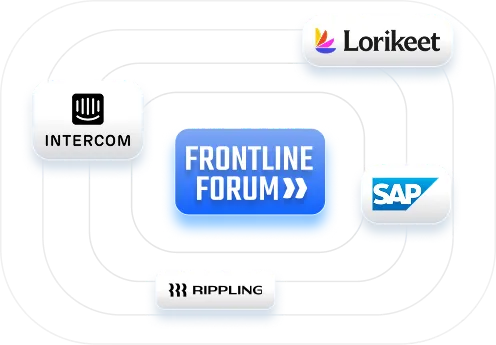Customer Success Operations (CS Ops) is a relatively new yet rapidly evolving function within the realm of Customer Success.
Its emergence signifies a shift in how businesses perceive the role of Customer Success in their overall strategies. As the landscape of customer success continues to change and evolve, companies are recognizing the vital role that CS Ops plays in ensuring customer satisfaction, fostering loyalty, and, consequently, driving sustainable business growth.
In this blog, we delve into the invaluable insights from CS Ops leaders who have harnessed their experiences to offer nine essential tips and tricks to build and scale your CS Ops team. These experts have traversed the evolving landscape of CS Ops, shaping it into a strategic powerhouse for enhancing customer experiences, boosting retention, and driving business success.
From building a scalable CS Ops function to fostering cross-functional decision-making, their wisdom provides a comprehensive roadmap for anyone seeking to excel in the world of Customer Success Operations. Join us as we uncover the strategies and lessons from these seasoned CS Ops leaders.
Tip 1
CS Ops should map everything back to the customer’s voice: Deborah Andrews of Unit4
In CS Ops, the fundamental principle is to map everything back to the customer's voice. This means that every decision, strategy, and action within CS Ops should be guided by a deep understanding of customer needs and feedback. This means maintaining ongoing dialogue with customers for agile adaptions and continual improvement. By focusing on the customer's perspective, CS Ops can ensure that its efforts are aligned with enhancing the overall customer experience.
Successful CS Ops professionals should have the ability to drive change, optimize processes, and achieve growth and scalability while always keeping the customer's voice at the forefront of their efforts. CS Ops teams should also maintain a strong connection with customers to use their feedback to inform decisions and prove the value and impact of CS Ops within the organization.
For the full conversation with Deborah Andrews, head here.
Tip 2
Use this 8-stage CS Ops maturity framework for your organization: Tony Macias of Salsify
Building a scalable CS Ops function involves progressing through eight key stages. They provide a roadmap for establishing a modern CS Ops framework that aligns with the organization's goals and fosters a customer-centric approach.
Stage 1: CS Ops planning
Hire and develop CS Ops talent. Ensure the team meets both internal and external customer experience expectations.
Stage 2: Tool deployment and maintenance
Manage the tools and systems necessary for CS Ops, including handling tickets, monitoring user data, and tracking customer product usage.
Stage 3: Process execution
Implement processes and procedures for activities like customer surveys, feedback collection, advocacy programs, and renewal operations.
Stage 4: CS team planning
Segment and structure the CS team for better executions.
Stage 5: Standardization
Create playbooks and campaigns for different customer segments, such as low-touch or tech-touch customers, and ensure consistent service quality.
Stage 6: Intelligence gathering
Collect and analyze data. Identify cross-functional indicators and improve reporting and forecasting capabilities.
Stage 7: Enablement
Train and empower the CS team to meet customer needs head-on. The team needs to be equipped to proactively address potential issues before they escalate. The training would also give them the confidence to tackle challenges effectively.
Stage 8: Strategy
Foster cross-functional decision-making, ensuring customer experience initiatives are incorporated throughout the organization. Provide executive leaders with the necessary data and insights for informed discussions and decisions.
For the full conversation with Tony Macias, head here.
Tip 3
Building a CS Ops function from scratch: Arundhati and Saranya at Chargebee
The establishment of a CS Ops function becomes increasingly vital as a company scales and matures. This transition often begins when a company's existing team is no longer able to manage all the necessary tasks. The primary role of a CS Ops personnel is to utilize data, tools, and processes to ensure that the customer success function runs efficiently and contributes to organizational success.
When establishing a CS Ops function from scratch in your organization, look for individuals with experience in customer-facing roles or SaaS. This can prove to be advantageous since they will be able to understand customer data better and track KPIs to generate more actionable insights. A well-established CS Ops function contributes to the growth, profitability, and customer satisfaction of a business, making it an essential component of an organization's success, and it's about using data to improve the customer experience while driving revenue.
For the full conversation with Arundhati and Saranya, head here.
Tip 4
The importance of data, tools, and process when building the CS Ops team: Karen Werner
Building an effective CS Ops team hinges on four crucial elements:
- Data expertise: Include team members who excel at data analysis, understand company data sources, and can generate meaningful reports without extensive BI tools.
- Digital strategy and onboarding: Employ individuals with expertise in crafting post-sale customer success strategies and optimizing the onboarding experience.
- Project and program management: To efficiently manage initiatives and resources, appoint someone capable of prioritizing and overseeing multiple projects.
- Training and enablement: Ensure that Customer Success Managers (CSMs) receive continuous training and support for their career growth.
In addition to these skill sets, your CS Ops team must be adaptable, flexible, and collaborate effectively with other teams. Working closely with customer-facing departments, CS Ops should break down barriers and align with the goals of customer success directors and managers. Creating a collaborative team that empathizes with the customer is key to CS Ops success.
For the full conversation with Karen, head here.
Tip 5
Hiring the right people to build a solid CS Ops function: Asaf Klein at AppsFlyer
Building a robust CS Ops function requires diverse skills, structured hiring, and a three-pillar approach. Here are some key elements to remember when hiring for a CS Ops role:
- Diverse skill sets: CS Ops professionals require data, relationship management, and service-oriented skills. They will need to focus on delivering value to customers and maintaining positive relationships.
- Phased hiring: Start with hiring analysts to work with customer-facing teams and consider adding a CS Ops leader later as the team grows.
- Three core roles: Organize the CS Ops team into three core pillars: Analytics/Strategy Analysts, Operations Specialists, and Enablement Leads. This allows for efficient data analysis, process management, and continuous improvement.
- Client-centric focus: Customer-focused, data-savvy, team players are extremely crucial when building the CS Ops function.
- Ongoing growth: The CS Ops function evolves over time. So, start with refining processes, optimizing data, and demonstrating CS impact and retention. Later, you can concentrate on scaling, optimizing KPIs, and engaging in broader company initiatives.
For the full conversation with Asaf Klein, head here.
Tip 6
Empathy is key to succeeding in CS Ops: Phil Hart and Asia Tillotson at Goodlord
Empathy is a cornerstone of success in CS Ops. It's about genuinely understanding customer needs and pain points to improve operations. It enables professionals to consider how their actions impact customers, manage stakeholder relationships effectively, and deliver value with a data-driven, customer-centric approach. It helps manage internal teams by understanding their challenges and aligning processes.
Empathy also fosters a mindset that seeks to create scalable solutions and achieve efficiency, consistency, and time savings for the business. A data-driven mindset combined with empathy helps CS Ops teams to identify the right customer success metrics, ultimately ensuring that their actions result in tangible, positive impacts on the customer journey. The quality of empathy helps CS Ops shift problem-solving from a customer-specific focus to a more scalable approach, making operations more efficient and effective. Experience in customer-facing roles, regardless of the field, can provide a unique advantage, cultivating empathy and stakeholder management abilities.
For the full conversation with Phil Hart and Asia Tillotson, head here.
Tip 7
How to transition to a CS Ops role: Jennie Li and Allastair Meffen at Definitive Healthcare
Transitioning to a CS Ops role involves defining your role and responsibilities, focusing on a mix of skills such as attention to detail, data analysis, project management, and adaptability. While individuals with a background in customer success are valuable for their understanding of the domain, the CS Ops team can benefit from a blend of skill sets, including people with project management experience and data analysis skills.
A crucial aspect of CS Ops is to keep a keen eye on the bigger picture while meticulously handling details. Building a CS Ops function also requires advocating for the team's importance and demonstrating its ROI through more efficient operations and improved onboarding processes. It's a dynamic role that combines elements of process management, analytics, and cross-functional collaboration, and it plays a vital role in achieving business objectives and customer success.
For the full conversation with Jennie Li and Allastair Meffen, head here.
Tip 8
Things to keep in mind when transitioning to a CS Ops role: Soumitra Joshi at Trifacta
Transitioning to a CS Ops role combines technical skills, attention to detail, and effective communication, making it a rewarding role for process improvement enthusiasts. A few things to keep in mind in looking to switch to a CS Ops role include:
- Choose your own path: Decide between customer-facing roles and CS Ops, as they are very distinct.
- Data skills: Develop skills in working with data, databases, and relevant software tools such as Excel, Salesforce, Gainsight, or others used by your organization.
- Patience and detail-orientation: Be prepared for recurring tasks and the need to ensure data consistency. Small details can matter significantly in CS Ops.
- Independent problem solving: You'll often need to come up with ideas on the spot and independently identify and fix issues in processes or data.
- Effective communication: Learn to collaborate with cross-functional teams and present data-backed insights.
- Adapt to continuous change: Understand that CS Ops is an evolving field. Your work is not about creating a perfect process but about making continuous improvements to meet the company's evolving needs.
- Influence with data: Leverage data to influence decisions and identify customer trends. For example, use data to identify trends or potential risks in customer behavior.
- Community and learning: Join CS Ops communities, like Preflight, to connect with peers, learn from their experiences, and stay updated on industry trends.
For the full conversation with Soumitra Joshi, head here.
Tip 9
How to find your purpose and fulfillment in CS: Sonam Dabholkar at Gong
Ikigai is a state of well-being that arises out of being engaged in activities that bring a sense of purpose and fulfillment. Here are some key pointers on how to find your ikigai when transitioning to a role in CS :
- Self-reflection and energy: To discover your ikigai in CS , start by reflecting on what truly energizes you within your current or previous roles. Identify tasks and responsibilities that resonate with you.
- Passion for strategy and operations: Recognize your passion for strategy and operations as a guiding factor.
- Skills development: Focus on honing essential skills such as business acumen, project management, analytics, and team collaboration. These capabilities will serve as a foundation for your transition.
- Specialization: As you continue in your CS career, consider specializing in specific areas that genuinely interest you. This will help you stand out from competition.
- Contribute to growth: Actively contribute to the growth and development of the CS Ops field. It's a rapidly evolving discipline, and your involvement can shape its future, and add purpose to your work.
- Self-advocacy: Promote your value and advocate for the growth of CS Ops within your organization, opening up new opportunities.
- Continuous learning: Embrace change and stay open to learning and new challenges in your career to uncover your ikigai and find fulfillment.
For the full conversation with Sonam Dabholkar, head here.
For more such content, join our private, invite-only Slack community, Preflight. You will also gain access to insights from peers, and get to share knowledge on customer onboarding, implementation, and customer success.

























.webp)